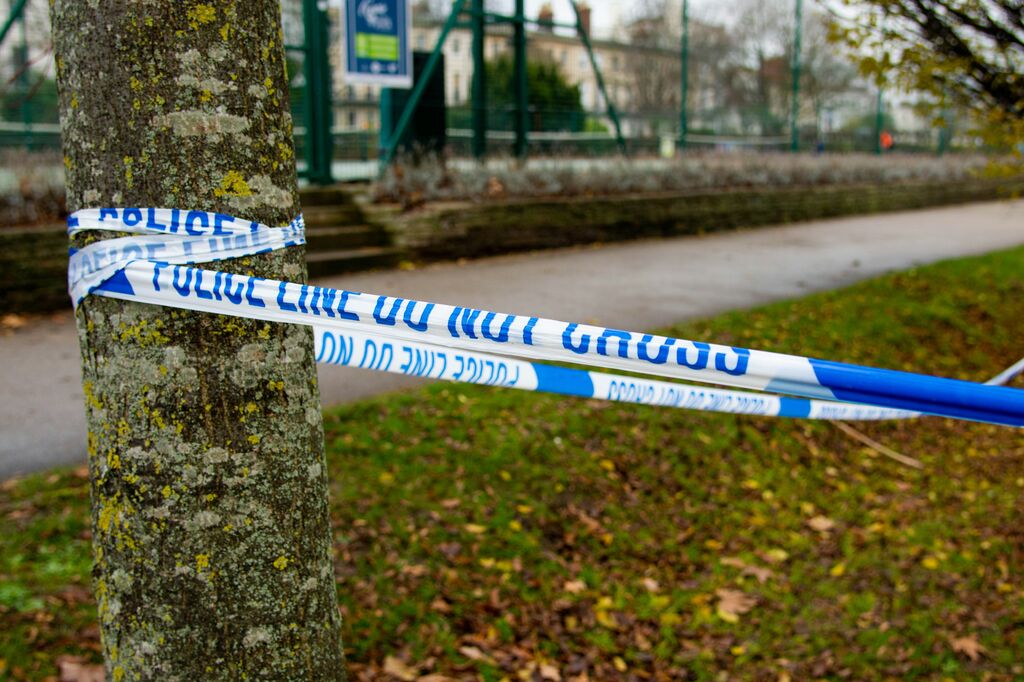Is Britain becoming increasingly lawless?

I don’t know about you, but the terrifying knife attack a week ago on an LNER train near Peterborough really shook me.
To be trapped on a moving train, with its narrow passageways, whilst a man with a knife is marauding through the carriages must have been horrendous. My heart goes out to all those who sustained injuries as well as feeling pride and amazement at the bravery of the unarmed guard, Samir Zitouni, who confronted the knifeman and is now critically ill in hospital.
Whenever such atrocities occur, it’s natural to feel a range of emotions. From relief that you are not personally involved, to fears about the future. Why are such attacks becoming a more common part of our daily lives?
Sadly, since the London Bombings of 2005, our national life has been routinely punctuated by terrible atrocities, some terror-related, others not. For example, the terrible Manchester bombing in 2017, which was the deadliest terror attack on UK soil since the 2005 London bombings. Or the terrorist attack outside Westminster, also in 2017. Or the 2019 London Bridge stabbings, the Southport stabbings just last year, and now the recent Huntingdon Train Attack.
I am quite sure that the collective weight of successive attacks is a major contributing factor in the narrative at large today that we live in an increasingly lawless nation.
Lawless Britain?
After all, it is not just the Huntingdon Knife attack and other atrocities that feed this narrative. Simple government mistakes in recent months have also not helped! Think of Epping migrant sex offender, Hadush Kebatu, who was mistakenly released from prison and spent several days on the run. Even this week, the Government has got in trouble again for the accidental release of two violent offenders from Wandsworth Prison.
Given that such stories understandably receive a lot of attention in our media, it is little wonder that the public are alarmed! A large survey of public attitudes in summer 2025 showed that Brits think crime is out of control and people do not trust the police or the government to sort it out.
So, you can grasp why Nigel Farage has chosen to make this a key priority for Reform. Over the summer, he launched a six-week campaign with the slogan, ‘Britain is lawless’.
As Christians, all of this should matter deeply to us. For one thing, we believe in a God who brings order to chaos. We know that if we are seeking the good of our land (Jeremiah 29:7), then we should pray and advocate for safety on our streets. Law and order also create conditions where gospel work can be done without fear or (for the most part!) prejudice. It is good for our mission as salt and light (Matthew 5:13-16) when we can follow Jesus in a country where criminals are punished and crimes rates are kept low.
So, as we reflect on the dreadful knife attack and the shambolic mistakes of violent men being accidently released from prison, there are key, biblically-informed principles, that we must keep in mind.
We must seek the truth
As a striking illustration that fears over lawless Britain have travelled abroad, the journalist Matthew Goodwin told GB News that a friend from overseas who had seen the recent train knife attack texted him to ask: ‘what’s happening to your country?’
These sentiments are understandable, and it is possible you feel that way yourself. But I want to sound a note of caution. One of the problems with public perception is that sometimes it can be wrong. It’s that simple.
When brutal, horrific knife attacks happen, or when multiple incidents of prisoners being accidentally released happen in a few short weeks, we can start to believe the narrative that justice has broken down. But we must carefully search out the truth of things, rather than rely on our impressions and feelings. We must be careful lest the spirit of the age shapes our conclusions, rather than facts.
When you examine the statistics, a different picture emerges. I share this not to downplay the terrible crimes being committed, but to place them in a bigger context.
For example, former editor of the Spectator, Fraser Nelson, has shown that whilst the immigration population has doubled, violent crime has halved over the past 20 years.
He uses the Crime Survey for England and Wales to draw this conclusion and corroborates it by looking at NHS stats on treatment for violent crimes. It shows violent crimes trending down for the same length of time.
In London, knife crime injuries are at a 25-year low. Monthly murder figures are also at a multi-year low.
So why is the public so convinced that crime is on the rise?
Partly because of social media. But also because, as Nelson points out, low-level crimes like tailgating and shoplifting are increasing. When you’re in your local supermarket and you see chocolate bars with security tags, it gives the impression of lawlessness.
Yet, as Cardiff University’s Violence Research Group say in their 2025 report, “over the past two and a half decades serious violence in England and Wales has decreased substantially.”
As followers of Jesus, we must be committed to the truth. We must not simply peddle or believe false narratives that we come across on social media. We should also be wary of our own echo chambers.
Proverbs 12:22 says: “The LORD detests lying lips, but he delights in people who are trustworthy.” Jesus himself was full of ‘truth and grace’ (John 1:14) and so we should be like him. That means searching for a fuller, bigger picture of what is happening on our streets. If we do, we’ll quickly see that, arguably, our streets have never been safer.
Yet crime will always exist
We react with such horror to especially violent crimes, in part because they are so uncommon, thank God, but also because of what they are: awful, horrendous reminders of how broken and fallen our world and the human heart is.
Of all people, surely it is Bible-believing Christians who best understand the evil that men and women are capable of.
After all, our Bible tells us that ‘there is no-one who does good, no not one.” Immediately after the account of man’s fall into sin, what do we read about? Cain murdering his own brother because he was jealous of him.
Or what about the book of Judges? As you read that book, it is like your face is being rubbed with the brutal awfulness of sin and what it can do to people. And one of the worst elements of Judges is that God’s own people become guilty of the sins of pagan nations, where even innocent children were sacrificed on cruel altars to false gods.
And of course, the Cross of the Lord Jesus is the starkest example of the evil people are capable of. They took an innocent man, crucified him and even rejected the opportunity to release him in exchange for a known terrorist.
Amidst, then, my own reaction to the knife attack on the train, there was a part of me that was not surprised by what had happened. I even said to a few friends I was surprised this had not happened in the same way before.
After all, unlike flying, there is no passenger security before getting on a train. Your bags are not searched. In theory, it would be very easy to get on any train in this country with a knife and carry out a dark, twisted, evil deed.
Surely our real surprise should be that our society is not dominated by more violent crime? We should be surprised at the statistics shared earlier. It is the common grace of God that restricts and restrains sin.
Government has a crime-busting mandate from God
A key part of this common grace is the role that governments are supposed to play in keeping us safe. The desire for the criminal justice system (not the same as government, but overseen by the Ministry of Justice) to carry out its role effectively is entirely right.
When the man with the knife started attacking fellow passengers on the LNER train last Saturday, I’m sure all of us felt both revulsion and the instinctive desire for justice to be done.
And more specifically, for retributive justice to be carried out. We want, rightly I think, to see the perpetrator punished. One reason we desire this is because retributive justice can be an effective deterrent to others.
In society, it is not up to us to decide for ourselves what an appropriate punishment should be. The government have a God-given role to play in keeping our streets safe.
Romans 13:4-5 says: “For the one in authority is God’s servant for your good. But if you do wrong, be afraid, for rulers do not bear the sword for no reason. They are God’s servants, agents of wrath to bring punishment on the wrongdoer. Therefore, it is necessary to submit to the authorities, not only because of possible punishment but also as a matter of conscience.”
The line ‘rulers do not bear the sword for no reason’ is key. We should have a healthy, appropriate fear of the governing authorities and this fear should be partly what motivates us to obey the law.
But when the government makes repeated mistakes on prisoner releases that see violent men wrongly back on our streets, we should feel righteously angry! Data from the Ministry of Justice reveals that the number of violent offenders mistakenly released has increased from 9 in 2023/24 to 87 in the year to March 2025.
When our prisons are overflowing to the point that thousands are released early, with all the risks involved, we should feel frustrated!
When we read about how long it takes to secure justice through the courts, or about overly lenient sentences we should speak out.
Justice and mercy
Perhaps most challenging of all is to think more biblically about the man responsible for the knife attack. At this stage, we do not know much about him, apart from the fact he’s a British citizen.
What is a Christian way to think? Certainly, we want a fair trial and retributive justice to be served. He committed an act of unspeakable violence against men and women made in God’s image. Basic biblical justice means an ‘eye for an eye and a tooth for a tooth’ .
In Micah 6:8 we are told how we must live: “He has shown you, O mortal, what is good. And what does the Lord require of you? To act justly and to love mercy and to walk humbly with your God.”
One way this text is lived and worked out when it comes to criminal justice is when we, alongside retributive justice, also pursue some form of restorative justice. This is where the offender has a chance to meet their victims, acknowledge their wronging and apologise for harming them. Biblically we would recognise this as a call to repentance.
I don’t think in this case that form of justice is appropriate because of the seriousness of the crime committed. But the broader point is that a true Christian understanding of justice will reflect both retributive elements and where appropriate, restorative elements.
Fundamentally, this man is not beyond the saving and restoring grace of God. That is the sheer power and wonder of the gospel of grace. If he truly repents of his sin and trusts in Jesus then, even as he experiences temporary punishment in this life, he will be spared an even worse judgement in the age to come.
A final challenge
So, my challenge as we reflect on the Huntingdon train knife attack and the broader narratives of ‘lawless Britian’ is to avoid lazy conclusions! We are truth adherents, it is right that we investigate the facts. And they tell us our country has never been safer.
Moreover, we should not be surprised when atrocities occur, but rather surprised that they do not happen more often. Praise God for His restraining grace. This does not mean our frustrations are entirely invalid and we must hold governments to account to fulfil their God-given role to punish evil.
As followers of Jesus, our desire for justice must always be balanced with mercy. We should long for justice to lead to genuine reform—where someone feels real remorse and leaves prison better able to live and work among us as a good citizen. We should believe and hope for gospel transformation, even for the most violent, and brutal offenders.






